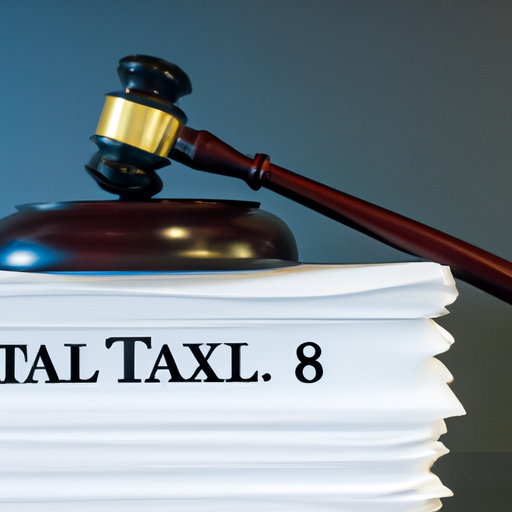Are you facing a tax dispute that has escalated to the point where legal action is necessary? When it comes to tax litigation, it’s crucial to have a skilled and experienced attorney by your side. With their expertise, they can guide you through the complexities of tax law and help you navigate the legal process. Whether you’re an individual or a business owner, understanding the importance of seeking professional help is key. In this article, we will explore the circumstances that may lead to tax litigation and explain why having a knowledgeable lawyer is essential. With their guidance, you can protect your rights and achieve a favorable resolution. So, if you find yourself in the midst of a tax dispute, don’t hesitate to reach out to the experienced lawyer listed on this website for a consultation.

Understanding Tax Litigation
Tax litigation refers to the legal process of resolving disputes between taxpayers and tax authorities. When conflicts arise regarding tax assessments, compliance, or potential criminal tax cases, legal action may become necessary to protect your rights and interests.
When is Legal Action Necessary?
Disputes with Tax Authorities
Legal action may be necessary when disputes arise between taxpayers and tax authorities. This can happen when there is a disagreement on the amount of taxes owed, the interpretation of tax laws, or the validity of penalties imposed by the tax authorities.
Challenging Tax Assessments
If you believe that your tax assessment is incorrect or unjust, you have the right to challenge it through tax litigation. This may involve proving that the tax calculation was incorrect, presenting evidence to support your claims, or arguing that the tax laws were misapplied.
Criminal Tax Cases
In some cases, tax litigation becomes necessary when criminal charges are brought against taxpayers for tax evasion or fraud. These cases can be complex and require skilled legal representation to protect your rights and mount a strong defense.
Finding the Right Tax Litigation Attorney
When facing tax litigation, it is crucial to find the right attorney to represent you. Here are some factors to consider in your search:
Experience and Expertise
Look for a tax litigation attorney with extensive experience and expertise in handling similar cases. They should have a deep understanding of tax laws, regulations, and court procedures related to tax litigation.
Track Record of Success
Consider the attorney’s track record of success in tax litigation cases. Review their past results and see if they have achieved favorable outcomes for their clients. A successful attorney will be able to present their accomplishments and highlight their ability to navigate complex tax litigation matters.
Client Reviews and Testimonials
Read reviews and testimonials from the attorney’s previous clients. This will give you insights into their professionalism, communication skills, and ability to handle the pressures of tax litigation. Positive feedback from satisfied clients can give you confidence in your choice of attorney.
Assessing the Strength of Your Case
Before proceeding with tax litigation, it is important to assess the strength of your case. This involves evaluating the evidence, analyzing the relevant tax laws and regulations, and understanding the potential risks and benefits of pursuing legal action.
Consulting with an experienced tax litigation attorney can help you evaluate the strengths and weaknesses of your case and determine the best course of action.

Preparing for Tax Litigation
Gathering Evidence
Strong evidence is crucial in tax litigation cases. You need to gather relevant documents, financial records, and any other evidence that supports your position. This may include receipts, invoices, bank statements, correspondence with tax authorities, and expert opinions.
Documenting Tax Compliance
To strengthen your case, ensure that your tax compliance is well-documented. This includes maintaining accurate records, filing tax returns on time, and keeping receipts and invoices organized. Proper documentation can help demonstrate your good faith efforts to comply with tax laws.
Considering Settlement Options
During the preparation phase, it is important to consider settlement options. Tax litigation can be time-consuming and costly, so exploring the possibility of reaching a settlement with the tax authorities may be a viable alternative. Your attorney can advise you on the potential benefits and drawbacks of settlement negotiations.
The Process of Tax Litigation
Tax litigation follows a specific process that includes several stages:
Filing a Lawsuit
To initiate tax litigation, you or your attorney will file a lawsuit against the tax authorities. This involves preparing and submitting the necessary legal documents and paying any required fees.
Discovery and Evidence Exchange
Both parties engage in the discovery process, where they exchange relevant documents and evidence. This allows each side to gather information and build their case.
Motions and Hearings
During the litigation process, various motions and hearings can take place. Motions can be filed to request specific actions or decisions from the court, and hearings provide an opportunity for both parties to present their arguments.
Trial and Appeals
If the case proceeds to trial, both parties present their evidence and arguments to the court. The judge or jury then decides the outcome. If either party is dissatisfied with the decision, they may appeal to a higher court.
Protecting Your Interests During Litigation
While going through tax litigation, it is essential to protect your interests. Here are some key considerations:
Statute of Limitations
Be aware of the statute of limitations for tax litigation cases. This is the time frame within which legal action can be initiated. Failing to file within the prescribed time limits may result in your case being dismissed.
Preserving Records
Keep all relevant records and documents related to your tax litigation case. This ensures that you have the necessary evidence readily available and can provide it when needed.
Communications with Tax Authorities
During tax litigation, it is important to have open and professional communication with the tax authorities. Your attorney can guide you on how to interact with them in a manner that protects your rights and minimizes the risk of further conflicts.
Alternative Dispute Resolution
In some cases, alternative dispute resolution methods can be explored as an alternative to traditional litigation. These include mediation and arbitration.
Mediation
Mediation involves a neutral third party who facilitates negotiations between you and the tax authorities to reach a mutually agreeable solution. This can be a less adversarial and more cost-effective approach to resolving tax disputes.
Arbitration
Arbitration is another alternative to traditional litigation. In arbitration, both parties present their arguments and evidence to an arbitrator who then makes a binding decision. This can be a quicker and more streamlined process compared to litigation.

Understanding the Costs of Tax Litigation
Tax litigation can be costly, both in terms of legal fees and potential penalties. It is important to discuss the costs with your attorney upfront and understand the potential financial implications of pursuing legal action. Your attorney can provide a clear breakdown of the expected costs and help you make an informed decision.
FAQs About Tax Litigation
What is tax litigation?
Tax litigation refers to the legal process of resolving disputes between taxpayers and tax authorities. It involves taking legal action to protect the rights and interests of the taxpayer in cases such as tax assessments, disputes with tax authorities, or criminal tax cases.
How long does tax litigation typically take?
The duration of tax litigation can vary depending on the complexity of the case, the court’s schedule, and other factors. It can range from several months to several years.
What are the potential outcomes in tax litigation?
The potential outcomes in tax litigation vary depending on the specific case. Possible outcomes include a favorable judgment in your favor, a settlement agreement with the tax authorities, or an unfavorable judgment against you.
What should I look for in a tax litigation attorney?
When selecting a tax litigation attorney, look for experience and expertise in handling tax-related cases. Consider their track record of success, client reviews, and testimonials to ensure you are choosing a skilled and reputable attorney.
Can I settle my tax dispute without going to court?
Yes, it is possible to settle a tax dispute without going to court. This can be achieved through negotiation and settlement discussions with the tax authorities, as well as alternative dispute resolution methods such as mediation or arbitration.
By seeking the assistance of a qualified tax litigation attorney, you can navigate the complexities of tax disputes and protect your rights and interests. Don’t hesitate to reach out to a legal professional for guidance and representation tailored to your specific case.



